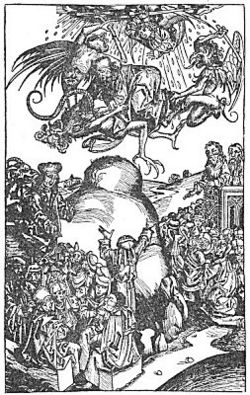A class of literature
already in existence in Antiquity, but very popular in de Middle Ages, were the
Exempla, anecdotes to illustrate a
moral point. These exempla were often used by preachers to ornate their
sermons. Especially for such purposes collections of exempla were gathered and one of those collectors was Jacques de
Vitry (Jacobus de Vitriaco, c. 1160/70 – 1 May 1240), a French theologian. These
stories have often a comic and even absurd twist and are full with
stereotypes. Still – or because of that
- they do have their charm, and as the
language is often quite simple, they can serve as easy reading, be it not in flawless
Classical Latin. In the following story a wife has to bring the best tooth of
her husband to her lover, as proof that she loves him more than her husband. Shrewd
wives and credulous men are recurring topics in exempla and I guess much to the joy of the public.
There is no translation,
but that isn’t necessary with these simple texts.
Jacques de Vitry, Exempla, number
248 (text after Jakob Ulrich, Proben der
Lateinischen Novellistik des Mittelalters, Leipzig 1906)
Audivi de quadam mala
muliere, cui maritus ejus per omnia credebat, quae cum ire vellet adulterum
suum, dicebat viro suo, "Infirmus es, intra lectum meum, et sudabis, et
vide ne surgas donec dixero tibi." Tunc illa firmans ostium camerae, et
secum clavem portans, ibat, et non revertebatur usque ad vesperum. Illе vero credens se esse infirmum, non audebat de lecto
surgere donec rediret uxor ejus, et diceret, "Amice, potes surgere: video
quod curatus es ab infirmitate." Quadam autem die, cum illa diceret adultero
quod diligeret eum plusquam maritum suum, ille respondit, "In hoc probabo
quod verum est quod dicis, si meliorem dentem
quem habet maritus tuus dederis mihi." At illa ad maritum reversa, cepit
plorare et tristitiam simulare. Cui maritus ait, " Quid habes ? Quare
luges?" At illa, "Non audeo dicere." "Volo," inquit,
"ut dicas mihi." Cumque ille multum instaret, tandem illa dixit,
"Tantus fetor ex ore tuo procedit, quod jam non possum sustinere." Ille
vero admirans et dolens ait, "Quare non dixeras mihi prius: possemne
aliquod remedium adhibere?" Cui illa, "Non est aliquod remedium, nisi
ut facias extrahi dentem illum ex quo tantus fœtor procedit." Et ita ad
exhortationem uxoris fecit extrahi bonum et sanum dentem quem illa ostendit illi,
et statim dentem illum asportavit et dedit leccatori. Non est facile credendi
uxori nec consiliis adulterae acquiescendi.
maritus: husband
credo credidi creditum (+ dat.): to trust
per omnia:
completely
infirmus:
ill
intro (-are): to enter
lectus: bed
sudo (-are): to sweat
vide: take
care
donec: until
firmo (-are): to lock
ostium: door
camera:
chamber, room
audeo ausus sum:
to dare
deligo delegi delectum: to love
in hoc probabo:
I will believe with this (proof)
cepit = incepit: began
ploro (-are): to cry
lugeo luxti luctum: to mourn, lament
insto institi
(-are): to urge, press
tandem: finally
fetor fetoris
(m.): bad smell
admiror admiratus: to wonder
doleo dolui:
to suffer, to feel sorry
adhibeo adhibui adhibitum: to furnish, apply, give
ut facias extrahi dentem: that you make the tooth to be extracted = you let
extract the tooth
quem illa ostendit illi: whom she pointed to him
asporto = abs-porto (-are): to carry away, transport,
leccator leccatoris: drunken person, lecher,
adulter
non..acquiescendi: It is not easy to trust a wife nor (is it easy) to believe the counsels
of an adulteress. (Note facile plus
genitive: in ML the genitive is often substituted for the dative. Apart from
that in CL facile is also constructed with the infinitive and ad plus gerund,
never with the gerund in the dative. ML happily mixes all constructions.)
